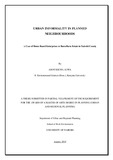| dc.description.abstract | This research focuses on informal sector activities in planned neighbourhood. Using
Buru-Buru as a case study, the research interrogates the nature and types of informal
sector activities in planned neighbourhoods, their drivers, impacts, and possible
planning intervention. The research made use of a holistic methodology combining
both quantitative and qualitative approaches drawing from primary and secondary
data sources. The key drivers of informality include various policy interventions,
population growth and urbanization, and weaknesses within planning institutions.
Further to this, the neighbourhood model as applied in Buru-Buru has demonstrated
some weaknesses that have contributed to informality within the estate. The
neighbourhood has undergone densification fuelled by low plot coverage, rising
demand for residential and commercial space, as well as weaknesses in enforcement
of development control. Most of the informal sector activities operate in contravention
to planning regulations, zoning and building standards. The study further reveals that
the informal sector is dominated with retail activities, most of which are survivalist in
nature. This demonstrates the weaknesses in the economic structure of the country
that has failed to adequately provide for livelihood opportunities. As a long term
intervention, the study recommends the use of regional planning as a tool for
generating livelihood opportunities. In the short term, the study recommends a
mixture of interventions such as use of localised development control instruments to
control proliferation of informal sector activities, as well as accommodation of some
of the activities, within agreed upon standards to address the issue of livelihoods. This
also calls for modification of the neighbourhood planning model to reflect the
dynamics of our urban areas. | en_US |

